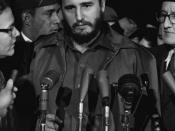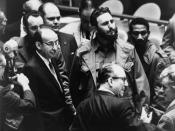The United States embargo on Cuba has lasted almost half a century. The U.S. has restricted a range of economic, political, military sanctions on Cuba since the early 1960?s. Some of the sanctions imposed by the U.S. are: ?U.S. aid to Cuba, a ban on U.S. arms sales to Cuba, etc.? Of course, the two U.S. refineries refused. Furthermore, Cuba?s response to the negative response of the refineries ?was to nationalize both companies? holdings in Cuba.? Once Cuba tried to nationalize both companies the United States imposed an embargo of sugar quota, which expanded to food, medicine, and eventually all trade between the two countries to weaken Cuba?s communist government. The embargo has been in place since the Cold War period from 1960-1989 in which, it became clear Cuba?s links to the old communist Soviet Union. The embargo has carried on to the post-Cold War period from 1990 - to the present.
Since the fall of the Soviet Union in 1992 there has been several Acts that have tightened the embargo. For example, the Helms-Burton Act, ?it is better known as a multi-faceted bill which restricts both American and foreign freedoms.? The Acts were enforced in the Clinton era for Fidel?s Castro attack of two civilian planes and ignoring human rights in Cuba. The embargo was loosened after the Pope visited Cuba in 1998. Since 1998, there have been many anti-embargo people (general public, congressman, businesses, etc.) that have argued that the U.S. will be better off lifting the embargo. On the contrary, the supporters of the embargo on Cuba believe that it is important to keep the embargo for many non-political reasons and until Castro is replaced.
The anti-embargo argues that the impact of lifting the embargo would benefit the U.S. economy tremendously. Reports show under the ?U.S.


